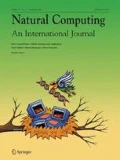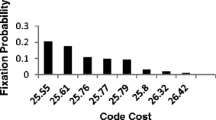Abstract
We have studied the canonical genetic code optimality by means of simulated evolution. A genetic algorithm is used to search for better adapted hypothetical codes and as a method to guess the difficulty in finding such alternative codes. Such analysis is performed within the coevolution theory of the genetic code organization. We have studied the progression of the canonical genetic code optimality within such theory, considering a possible scenario of a previous code with two-letter codons as well as the current organization of the canonical code. Moreover, we have analysed the particular optimality and progression of adaptability of the individual nucleotide bases.






Similar content being viewed by others
References
Di Giulio M (1989) The extension reached by the minimization of the polarity distances during the evolution of the genetic code. J Mol Evol 29:288–293
Di Giulio M (2000) The origin of the genetic code. Trends Biochem Sci 25(2):44
Di Giulio M (2005) The origin of the genetic code: theories and their relationship, a review. Biosystems 80: 175–184
Di Giulio M, Medugno M (1999) Physicochemical optimization in the genetic code origin as the number of codified amino acids increases. J Mol Evol 49(1):1–10
Di Giulio M, Capobianco M, Medugno M (1994) On the optimization of the physicochemical distances between amino acids in the evolution of the genetic code. J Theor Biol 168:43–51
Freeland S (2002) The Darwinian genetic code: an adaptation for adapting? Genet Prog Evolvable Mach Kluwer Acad Publ 3:113–127
Freeland S, Hurst L (1998a) The genetic code is one in a million. J Mol Evol 47(3):238–248
Freeland S, Hurst L (1998b) Load minimization of the genetic code: History does not explain the pattern. Proc R Soc 265:2111–2119
Freeland S, Knight R, Landweber L, Hurst L (2000a) Early fixation of an optimal genetic code. Mol Biol Evol 17(4):511–518
Freeland S, Knight R, Landweber L (2000b) Measuring adaptation within the genetic code. Trends Biochem Sci 25(2):44–45
Gilis D, Massar S, Cerf N, Rooman M (2001) Optimality of the genetic code with respect to protein stability and amino-acid frequencies. Genome Biol 2(11)
Goldberg D (1989) Genetic algorithms in search, optimization and machine learning. Addison-Wesley Longman Publishing Co., Inc., Boston
Goodarzi H, Najafabadi H, Nejad H, Torabi N (2006) The impact of including tRNA content on the optimality of the genetic code. Bull Math Biol 67(6):1355–1368
Haig D, Hurst L (1991) A quantitative measure of error minimization in the genetic code. J Mol Evol 33:412–417
Jukes T (1965) Coding triplets and their possible evolutionary implications. Biochem Biophys Res Commun 19:391–396
Jukes T (1973) Possibilities for the evolution of the genetic code from a preceding form. Nature 246:22–26
Knight R, Landweber L (2000) The early evolution of the genetic code. Cell 101:569–572
Knight R, Freeland S, Landweber L (1999) Selection, history and chemistry: the three faces of the genetic code. Trends Biochem Sci 24:241–247
Marquez R, Smit S, Knight R (2005) Do universal codon-usage patterns minimize the effects of mutation and translation error? Genome Biol 6(11):R91
Monteagudo A, Santos J (2007) Simulated evolution of the adaptability of the genetic code using genetic algorithms. Bio-Inspired Model Cognitive Tasks Lect Notes Comp Sci 4527:478–487
Schönauer S, Clote P (1997) How optimal is the genetic code? In: Frishman D, Mewes H (eds) Computer science and biology, German conference on bioinformatics (GCB 97), pp 65–67
Sella G, Ardell D (2001) The coevolution of genes and the genetic code. SFI Working Paper 01-03-015
Torabi N, Goodarzi H, Najafabadi H (2007) The case for an error minimizing set of coding amino acids. J Theor Biol 244(4):737–744
Woese C (1965) On the evolution of the genetic code. Proc Natl Acad Sci USA 54:1546–1552
Wong J (1975) A co-evolution theory of the genetic code. Proc Natl Acad Sci USA 72:1909–1912
Wong J (2005) Coevolution theory of the genetic code at age thirty. BioEssays 27:416–425
Yockey H (2005) Information theory, evolution, and the origin of life. Cambridge University Press, NY
Zhu C-T, Zeng X-B, Huang W-D (2003) Codon usage decreases the error minimization within the genetic code. J Mol Evol 57:533–537
Author information
Authors and Affiliations
Corresponding author
Rights and permissions
About this article
Cite this article
Santos, J., Monteagudo, Á. Genetic code optimality studied by means of simulated evolution and within the coevolution theory of the canonical code organization. Nat Comput 8, 719–738 (2009). https://doi.org/10.1007/s11047-008-9092-x
Received:
Accepted:
Published:
Issue Date:
DOI: https://doi.org/10.1007/s11047-008-9092-x




